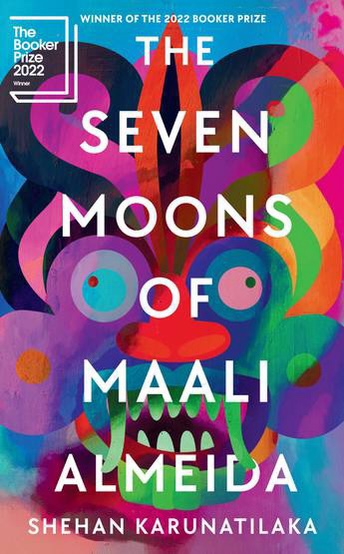Photojournalist and gambler Maali Almeida is dead. He wakes with no memory in a white waiting room where Helpers try to shepherd him towards the Light. But Maali makes a run for it and floats through the afterlife, looking for the people who killed him at a seedy casino. It’s 1990 and Sri Lanka is seven years into a nearly three-decade civil war, so there are plenty of people with a motive. Down There, in the world of the living, various interested parties hunt frantically for a stash of incriminating photos that Maali left behind — a Tamil NGO, the Sri Lankan army, the British embassy, but the boundaries between them seem rather porous and rather too connected to the Sri Lankan government. Maali tries desperately to reach his housemates Jaki and his lover DD, who might be able to help him find the photos and show them to the world.
There are rules he must follow. He can only travel on the wind wherever his remains are or where people say his name. He has seven moons, or nights, to enter the Light before his soul becomes open to attack by demons like the Mahakali. Helping him in his quest are a host of ghosts and ghouls, such as the young Tamil Sena, who is assembling an army of dead to take revenge on his murderers. The Seven Moons is a pulpy, action-packed novel, with something of the vibe of Watchmen meets Pixar’s Coco meets a video game (characters, or should that be players, even accumulate a post-life currency called “varam” to gain “skills”). It’s rather messy, with numerous punctuation and perhaps a couple of continuity errors making it into the edition I read, a distraction in most books but here adding to the chaotic vibe.
So much for Maali Almeida’s style, which is full of sex and swagger and, strangely, romance. The novel is above all a depiction of the grift and corruption that encourages war to flourish for the benefits of individuals. Maali is pragmatic about this reality, working for whoever he needs to to continue to take his photos. He is prone to cycnicism — who wouldn’t be with his experience? — but he is at heart an optimist, driven by a belief that by capturing the war’s atrocities on film he may one day shape history. At its best the novel lives in the tension between remembering and forgetting, and is ambivalent about either. It suggests the importance of recording history, but also that this may have little impact on the people experiencing it. Equally, all those vengeful and mournful ghosts and ghouls who can’t let go of their lives, refusing to pass through the River of Births where they will be cleansed of memory, seem to be playing a part in keeping the war alive.
Narrated in second person, a mode that eventually pays off by wedding Maali’s own perspective with the reader’s, the has the joyfully aphoristic prose of a comic. “Follow any turd upstream and it leads to a member of parliament,” goes one; “Don’t try to look for the good guys ’cause there ain’t none,” goes another, “Everyone is proud and greedy and no one can resolve things without money changing hands or fists being raised”. Maali Almeida is a rare war novel that is retains its poignancy and despair while also being a lot of fun.
Gay rating: 4/5 for queer characters, sex, relationships and themes.
